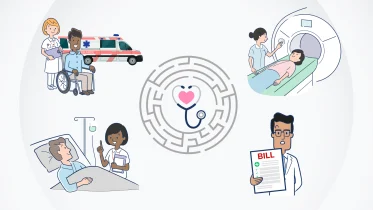Compare ambulance cover in New South Wales
The cost of an ambulance trip across Australia differs depending on which state you live in. New South Wales residents who need an ambulance could be hit with a hefty bill if they don’t have the right cover in place.
This guide looks at what’s covered and not covered by the state government, how exemptions work, and what NSW residents are covered for if they need an ambulance outside of their home state.
Live outside of NSW? We’ve also got a guide on how ambulance cover differs from state-to-state.
If you need ambulance services and live in New South Wales, you will have to pay a fee if you don’t qualify for an exemption. However, without the correct amount of coverage, expect an enormous bill for a hospital visit.
Key Points
NSW residents have to pay for ambulance journeys both at home and interstate.
Most health insurers offer ambulance cover as part of their hospital cover.
The starting cost for an emergency ambulance call-out is $428 if you don’t have the right cover.
What is ambulance cover?
Ambulance cover is a type of health insurance that covers your costs if you need to call out paramedics and/or get taken to hospital.
You can buy ambulance cover as a standalone policy, although most hospital covers will include ambulance call outs as standard.
For people who live in NSW and don't have the right cover, a trip in an ambulance could end up costing hundreds or even thousands of dollars.
Do you need ambulance cover in NSW?
It's certainly a good idea, unless you want to get hit with a large bill for calling out an ambulance.
ambulance cover NSW isn't handled by Medicare, and the state government only pays a portion of the costs. That means even a short journey could end up costing you hundreds of dollars.
Some residents are exempt from ambulance charges. We'll go into more detail on these a bit later in this guide.
COMPARE & SAVEDoes Medicare cover ambulance journeys in NSW?
No, Medicare doesn’t cover the cost of emergency transport or other ambulance services in NSW. So what does that mean for you? It means that if you don’t have private health cover – even basic hospital, which often includes ambulance cover – then you’ll be billed for any ambulance trips you need to take.
Depending on the urgency and length of your trip, this can mean an eye-watering bill. The only way to avoid paying for ambulance services completely out-of-pocket is to get the right level of health cover.
Ambulance cover waiting periods in NSW
Waiting periods apply to most services and treatments covered under your private health insurance, and they differ from provider to provider. So it’s very important that you read your health insurance policy documents to make sure you understand the waiting periods you’ll need to see out, before claiming for your ambulance cover.
The good news is that many policies have very short waiting periods – if any – for ambulance services. Most are just one day (to stop people from taking out a policy after they’ve already used an ambulance).
Both Bupa and nib, for example, have a 1-day waiting period for emergency ambulance cover. The former then has a 1-month waiting period for non-emergency transportation (with their Premium Ambulance cover only). Other insurers may have slightly longer waiting periods – HBF, for example, has a 7-day waiting period for emergency ambulance services.
What do ambulance journeys cost in NSW?
The good news is that the state government pays 49% of the costs of an ambulance trip in NSW (if you live there). The bad news is that you're still liable for 51% of the charge.
Call-out costs start at $428 for emergencies and you'll have to pay another $3.87 for each kilometre travelled. So if you're stranded far from a hospital or clinic and need an ambulance, your bill could run into the thousands without the right cover.
Ambulance Costs In NSW
| Emergency | Non-emergency |
|---|---|---|
Call-out | $428 | $338 |
Variable rate (p/km) | $3.87 | $2.09 |
Maximum charge | $7,023 | $7,023 |
Source: NSW Ambulance
How much do ambulance journeys cost for non-NSW residents?
New South Wales doesn’t offer free ambulance call-outs for all people from interstate or overseas - and because some providers don’t offer ambulance cover Australia-wide, that means you’ll need to check your policy document to see if your policy covers the costs of any ambulance services you may require while you’re visiting in NSW.
If you have hospital cover, and live in a state other than NSW/ACT, you may be covered by a reciprocal arrangement. Check with your insurer for details.
Here’s what non-NSW residents can expect to pay for an ambulance trip in NSW if they’re not covered by a reciprocal arrangement:
Ambulance costs for non-NSW residents
| Emergency | Non-emergency |
|---|---|---|
Call-out | $840 | $338 |
Variable rate (p/km) | $7.58 | $2.09 |
Maximum charge | N/A | N/A |
Source: NSW Ambulance
What should I look for in NSW ambulance cover?
There's a few things to check if you're buying ambulance cover.
Firstly, look over the policy to make sure you're covered for call-out fees, air ambulance and other transport, and the full amount of your costs.
You should also check if your policy covers you for interstate travel outside of NSW, and if your cover is applicable to non-emergency situations.
It's also worth considering if you may get better value for money by taking out hospital cover rather than ambulance cover.
Many cheap Basic hospital policies include ambulance cover and will mean you can avoid the Medicare Levy Surcharge and the Lifetime Health Cover loading (if you're over 31 and don't hold any form of hospital cover, you'll probably have to pay some loading.
COMPARE & SAVEHow much will it cost me if I live in NSW and don't have ambulance cover?
The good news is that the state government pays 49% of the costs.
The bad news is that you'll still be liable for 51% of the charge.
Call-out costs start at $415 and you'll have to pay another $3.74 for each km travelled.
Are there any waiting periods?
Yes, although typically this is only one day.
So you can't take out a policy after you've called out an ambulance and then try to make a claim.
Who is exempt from paying ambulance fees in NSW?
New South Wales ambulance services are provided at no cost for people who meet the criteria.
Here's a list of people who are eligible:
Victims of domestic abuse, sexual assault, or child abuse
Children or young people under the care of the state
People being involuntarily taken to a mental health facility
Health Care Card holders,
Pensioner Concession Card holders
Commonwealth Seniors Health Care Card holder
Repatriation Health Card holders (White or Gold)
How do I claim an exemption from ambulance costs?
To claim an exemption, you'll need your payment reference number, the issue date, and your concession card or other evidence of your eligibility.
Are ambulance fees waived for COVID-19 patients in NSW?
Yes.
Patients in NSW who have COVID-19 are now exempted from paying the invoice for ambulance rides.
The same thing goes if you have experienced side effects from the COVID-19 vaccine.
What health funds offer cover?
All the main funds such as Bupa, HCF, Medibank and ahm offer ambulance cover, either as a standalone policy or part of a hospital cover policy.
As ever, it pays to check what you're covered for before you buy and don't assume that you're automatically covered.
For example, HCI, one of the smaller health funds, doesn't offer ambulance cover with its hospital packages -- you'll need to take out an eligible extras policy with them instead.
Will I be covered if I'm interstate?
This is where it's worth checking.
Some policies will provide cover only in NSW, while some will provide cover in any state.
How do I choose the right cover in New South Wales?
Everybody's needs are different and it's worth considering if you just want ambulance cover, or if you want a policy that gives you a little bit extra. For example, do you want to avoid the Medicare Levy Surcharge?
Or have you turned 31 and want to avoid paying Lifetime Health Cover loading fees? Or do you want to be covered for a few common items like dental surgery and hernias as well as avoiding ambulance fees?
This is where the team at Compare Club comes in. We'll take the time, hassle and confusion out of finding the right policy. Our specialists can help you find suitable cover at an affordable price from our panel of insurers.
If you're a NSW resident and want ambulance cover, get started below. In just a matter of minutes, you'll see how much you could save.
COMPARE & SAVEThis article is opinion only and should not be taken as medical or financial advice. Check with a financial professional before making any decisions. Sources
https://www.hbf.com.au/health-insurance/products/ambulance/urgent-ambulance
https://www.iselect.com.au/health-insurance/ambulance-cover/new-south-wales/
https://www.ambulance.nsw.gov.au/our-services/accounts-and-fees
#Compare Club compares selected products from a panel of trusted insurers. We do not compare all products in the market.
Chris Stanley is the sales & operations manager of health insurance at Compare Club. With extensive experience and expertise, Chris is a trusted leader known for his deep understanding of health insurance markets, policies, and coverage options. As the sales & operations manager of health insurance, Chris leads a team of dedicated professionals committed to helping individuals and families make informed decisions about their health insurance needs.

Meet our health insurance expert, Chris Stanley
Chris's top health insurance tips
- 1
Australia’s public health system is world-class, but wait times for public hospitals can be long, inconvenient - and leave you living in constant pain while you wait.
- 2
An appropriate private health insurance policy can speed up your surgery, relieving your pain sooner.
- 3
Family health cover means your children are covered under the same policy as you.
- 4
Many health insurance policies come with a 12-month waiting period for pregnancy-related cover, so it’s a good idea to get a family policy organized well before starting your family. This means your child will be covered from birth until at least their early twenties (depending on which health fund you select).




